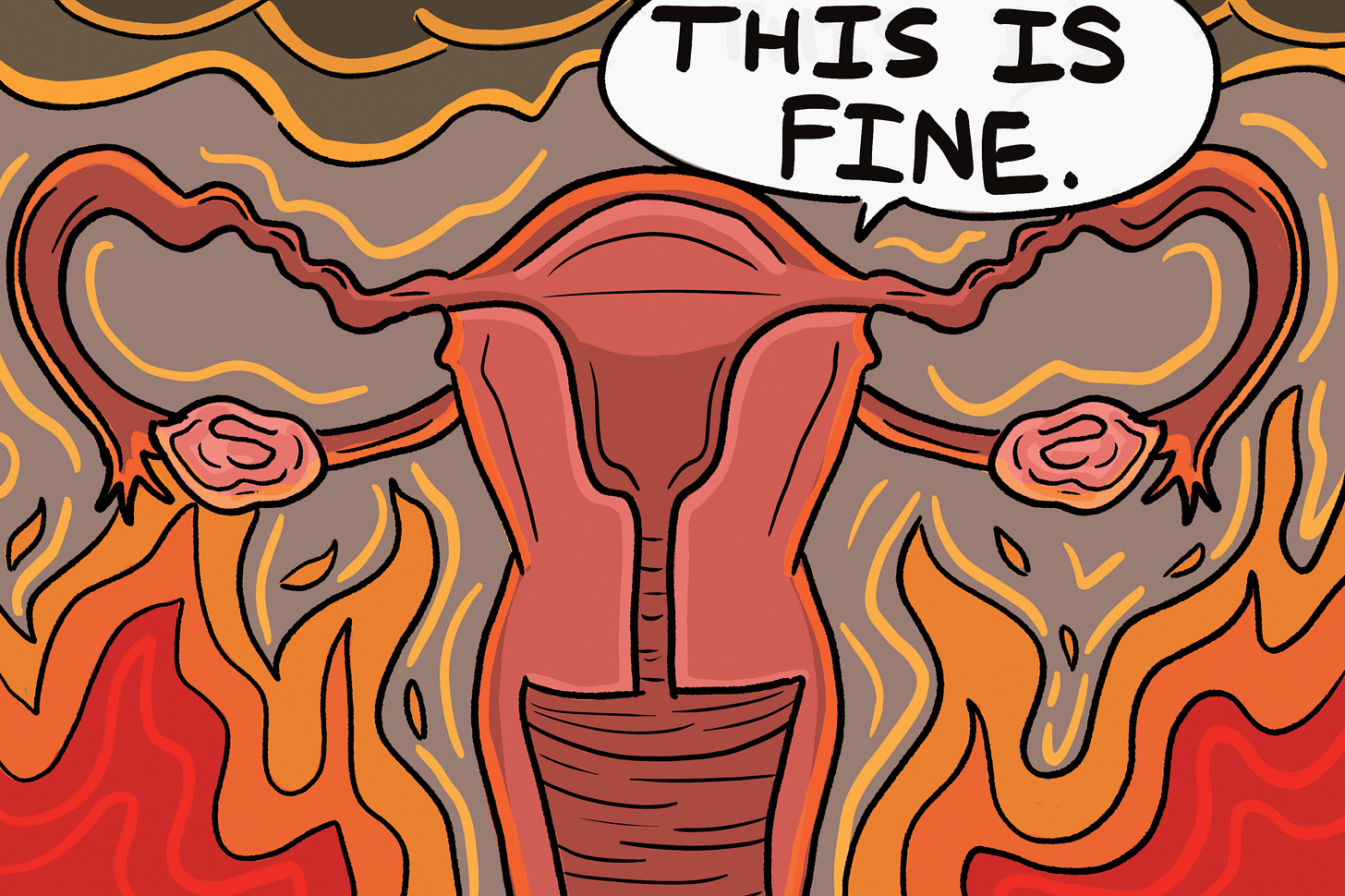How to Get Diagnosed with Endometriosis: An Intimate Walkthrough 🩸
All the (frustrating, painful, and completely unnecessary) steps that led to my diagnosis.
I've spent over two decades trying to understand what was happening to my body. This isn't just my story – it's one path through the medical maze that millions of people with endometriosis navigate.
When you're lying on your bathroom floor wondering if this is just another period or your body’s final betrayal, you develop a taste for dark humor. If you're reading this while clutching a heating pad to your stomach, know that the "steps" ahead might feel painfully familiar. Your path to diagnosis probably won't match mine exactly, but you'll likely recognize the trail signs along the way.
First, you need to start menstruating. You probably start earlier than most of your peers.¹
Your female relatives, friends’ mothers, and doctors dismiss the excruciating cramps, blackouts, vomiting-inducing agony, bowel irritation, and heavy bleeding as typical. What does an 11-year-old girl know about her own body, anyway? You try to explain the waves of explosive pain— like a vice grip in your abdomen, down your legs, and across your lower back interspersed with moments of heavy breathing and half-conscious confusion. They accuse you of exaggerating—‘It’s not that bad! You’ll get used to it!’ they insist.
Initially, doctors attribute your irregular cycle to your young age. Later, they blame your weight (regardless of your actual body fat percentage). Finally, they pin everything on stress.
You start to expect all medical appointments to conclude with a doctor throwing darts at a list of dismissive explanations.
You bleed through several pairs of pants and even a couple of jackets because a single pad cannot contain your flow for an entire class period from ages 11 - 17. Once more, this is brushed off as par for the course. You need to wear a white robe to your high school graduation while on your period and nearly black out from anxiety.
You begin to treat your body like a bomb without a timer, planning your life around its inevitable detonation. Navigating social and work obligations becomes a series of nearly impossible tasks: fighting waves of nausea while bleeding like a hose at the fair with new friends, stifling groans of pain during a hunting trip where you're the only girl, white-knuckling through an Americorps summer meals shift while entertaining groups of children, and seeking supplies at Universal Studios' first aid office during your one vacation of the year, only to hear they 'only treat emergencies.' As you know by now, you don't always succeed.
You take dangerous amounts of ibuprofen on an empty stomach in an attempt to alleviate the pain and develop something that feels suspiciously similar to stomach ulcers. You don’t bring this up to a doctor in case they label you a “drug seeker” or “problem patient.” They already routinely dismiss your menstrual pain; disclosing anything else might stir up suspicion.
You search for answers online. Almost every article about your menagerie of symptoms mentions endometriosis. Every relevant Reddit post features multiple comments suggesting endometriosis. You learn it takes an average of 9 - 12 years to get diagnosed.²
You bring up endometriosis to a few doctors. They tell you that you don’t meet the diagnostic criteria— criteria that strangely differs between medical offices. One gynecologist actually orders blood work, but everything checks out! You’re perfectly fine! “Just reduce stress and take ibuprofen,” they say.
The pain gets worse as you age. Your hormonal acne doesn’t go away, either.
You get into herbal medicine. Like really into herbal medicine. You download every book on herbalism you can find and drink gallons of raspberry leaf and mugwort tea. Unfortunately, you see no changes in your cycle or pain.
Doctors always suggest birth control. You assume it’s because they hear “sexually active” and don’t catch the “with women” part. They add that some types of birth control can sometimes help with periods in some women of certain ages. Convincing! You eventually give in and try it.
You take a few different pills and try two types of contraceptive rings. Although the meds muffle the explosions, your body is still a bomb. You breakthrough bleed with each method, even after a year of continual use. Doctors assure you it’s nothing unusual and suggest yet another method for you to try.
You begin to research hysterectomies and wonder if taking HRT for the rest of your life would be a good trade-off for the cycle-inflicted torture.
Once again, you look up every gynecologist on your insurance within a 50-mile radius in an attempt to find someone who will listen. This time, you find a childfree physician who discloses her veganism and thirteen(!) pet cats in her staff bio.
You schedule an appointment and prepare a brief script to explain your pain. Hopefully, you can deliver it between the inevitable interruptions during what you expect to be a five-minute consultation.
You are cut off a few sentences in, but only for the doctor to ask, “Have you heard of endometriosis?” You are too stunned to speak.
The doctor heard you, and you didn’t even make it through your entire spiel. Finally, it’s time to schedule an exploratory laparoscopy. On the day of your procedure, you worry that they won’t find anything. What if everyone was right? Maybe it’s all in your head after all. What if you’ve done all this preparation for nothing?
No need to worry! The doctor finds both endometrial lesions and a severely inflamed appendix. You’re charged three times more than originally quoted due to the unplanned appendectomy. The pathology lab confirms that endometriosis is present in the removed tissue and reveals another surprise— appendix cancer. You learn your body was a bomb in more ways than one. When would it have detonated without medical intervention? How long would you have suffered through the pain and inevitable dismissals? When would it have been too late?
Good news: the cancer was contained to the appendix, and you finally have an endo diagnosis! Bad news: the doctor couldn’t remove all the endometriosis—it's scattered like 'sprinkles' across your uterus and ovaries. You learn the only permanent “cure” is a total hysterectomy. Doctors warn that abdominal pain may be a sign of cancer recurrence. That new fear accompanies every subsequent cramp.
You continue trying birth control and find a remote job so you can suffer through your cycles at home without burning through your PTO. You ask your wife to rub CBD salve on your lower back between groans of pain and continue to weigh the pros and cons of a lifetime of HRT. What if you lose your insurance, another pandemic shuts down medical supply chains, or the inevitable nuclear apocalypse comes early and cuts off your access to these medications? Should you chance it? You decide it’s not worth the risk between detonations and curse your past self during every explosion.
Find me everywhere on the internet: linktr.ee/arieltypes
Resources:
Gynecologists who will perform a tubal sterilization Google Doc (physicians who are more likely to center patient concerns; my doctor is listed)
Natural Ways to Support Menstruation from Mountain Rose Herbs
Moon Cycle Tea for Painful Period Cramps from Herbal Academy
Citations:
John Hopkins. (n.d.). Endometriosis. hopkinsmedicine.org, from https://www.hopkinsmedicine.org/health/conditions-and-diseases/endometriosis
Kiesel L, Sourouni M. Diagnosis of endometriosis in the 21st century. Climacteric. 2019;22(3):296–302. doi:10.1080/13697137.2019.1578743








